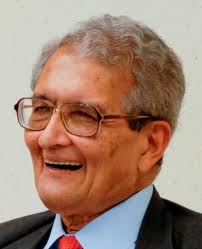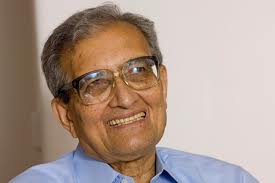Elementary education
Amartya Sen
India needs to broaden its base in the spheres of education, healthcare and women's equality to foster economic growth, said Nobel laureate Amartya Sen after receiving a honorary degree of Doctor of Literature from the National University of Educational Planning and Administration here on Monday,4th,July,2011,Speaking at the special convocation, Prof. Sen was as vehement in demanding an equitable status for women as he was in seeking reforms in education and basic healthcare. “India does have many achievements in the success of a relatively small group of privileged people well trained in higher education and specialised expertise. Yet our educational system remains deeply unjust. Among other bad consequences, the low coverage and low quality of school education in India extracts a heavy price in the pattern of our economic development,” he said.

 He said though the economy may be doing much better than before in many different ways, India is still paying quite a heavy price for having a far less educated general labour force than countries like China. “India has great difficulty in competing in a whole range of simple products, the making of which requires basic education including elementary gadgets such as clocks and calculators, even computer hardware, in which China excels, and which were among the mainstays of the earlier ‘East Asian Miracle',” he said. Critical of the neglect that elementary education has been subjected to since early Independence, Prof. Sen said though India's first Prime Minister Jawaharlal Nehru's vision for technical education resulted in a boom that has ensured institutes of excellence like the IITs, his attitude towards primary education is “lamentable.”
He said though the economy may be doing much better than before in many different ways, India is still paying quite a heavy price for having a far less educated general labour force than countries like China. “India has great difficulty in competing in a whole range of simple products, the making of which requires basic education including elementary gadgets such as clocks and calculators, even computer hardware, in which China excels, and which were among the mainstays of the earlier ‘East Asian Miracle',” he said. Critical of the neglect that elementary education has been subjected to since early Independence, Prof. Sen said though India's first Prime Minister Jawaharlal Nehru's vision for technical education resulted in a boom that has ensured institutes of excellence like the IITs, his attitude towards primary education is “lamentable.” He clarified that while Mr. Nehru understood the importance of technical education, the allocation of resources for primary education gave the impression that it was not considered high on the priority list for spending. Prof. Sen regretted that primary education had insufficient coverage; there was a huge number of out-of-school children and the quality of education was low. “India needs to widen its education base radically,” he said.On the current campaigns against black money in the country, the Nobel laureate said such campaigns were welcome and a result of the social commitment to eradicate the menace. Union Human Resource Development Minister Kapil Sibal, who conferred the degree on Prof. Sen, said the government was committed to giving access, equipment and quality education to students. The Minister said it would not be possible to achieve inclusive growth, which was central to the government policies, if this commitment was not adhered to.
Prof. John Kurakar
No comments:
Post a Comment